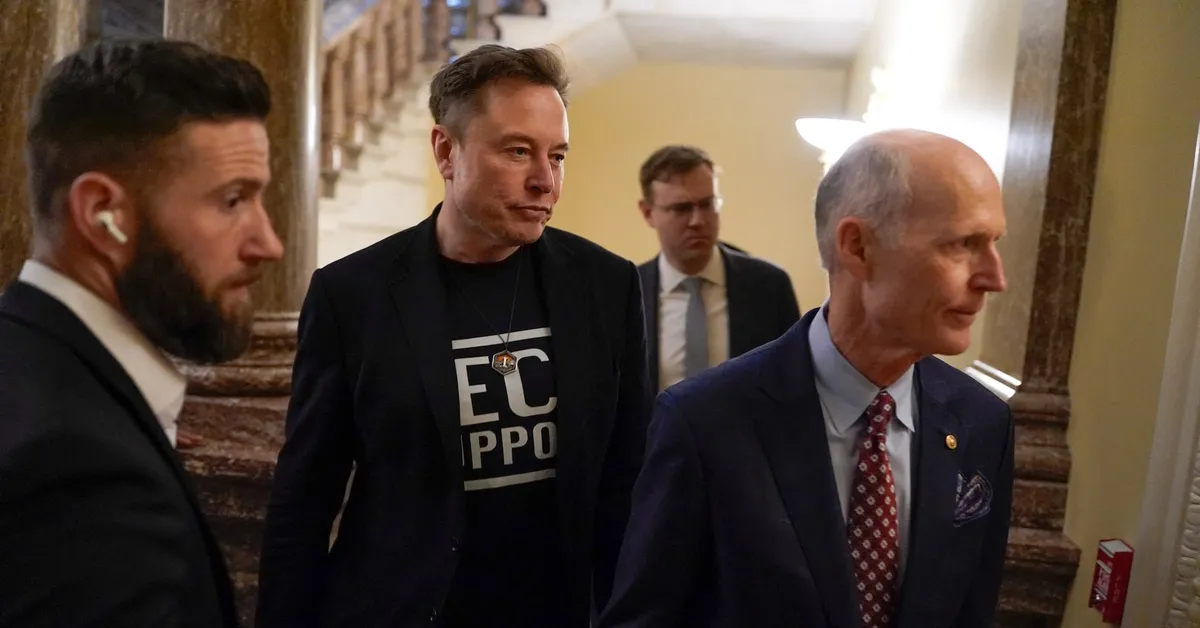
On March 5, 2023, U.S. Senate Republicans called for Congress to officially codify spending cuts proposed by billionaire Elon Musk's Department of Government Efficiency (DOGE). This push came after the Supreme Court ruled 5-4 against President Donald Trump's attempt to withhold funds from foreign aid organizations. Following a lunch meeting with Musk, Republican lawmakers expressed concerns that the ruling jeopardized the White House's goal of making unilateral cuts to spending allocated by Congress through the contentious process known as impoundment.
Senate Republican Rand Paul emphasized the importance of Congressional involvement in the spending cut process, stating, "There is a realization going to set in that Congress has to be a part of that." Paul expressed his support for Musk's efforts to eliminate wasteful spending, particularly in overseas programs. However, he also noted the necessity of formalizing these initiatives to ensure they persist beyond fleeting moments of political discourse.
Later that evening, Musk met with House Republicans to discuss DOGE's mission to identify wasteful spending. While many lawmakers applauded DOGE's initiatives, some expressed skepticism. Representative Frank Lucas from Oklahoma warned, "When you have a very small group with a broad set of powers, able to inflict dramatic change on institutions without a lot of knowledge, that means the process of cleaning up afterwards is going to be extensive."
Musk's advisory role to Trump was highlighted by Senate Republicans, who noted his enthusiasm regarding Paul's suggestion for the White House to seek Congressional approval to rescind spending through a legislative process that bypasses the Senate's 60-vote filibuster. Senator Lindsey Graham, chair of the Senate Budget Committee, remarked, "What we've got to do as Republicans is capture their work product, put it in a bill, and vote on it." He urged the White House to formulate a rescission package that Congress could consider.
The rescission process, established by Congress in 1974, permits presidents to cancel allocated funds through legislation that can be approved by simple majorities in both the Senate and the House of Representatives. This method was last utilized during former President Bill Clinton's administration. A previous attempt at rescission during Trump's first term did not succeed in the Senate.
House Speaker Mike Johnson indicated a willingness to collaborate with the White House, stating, "We'll do whatever the White House requests. It's a little premature to expect that, but that's certainly a possibility and one that we would entertain, if it's appropriate." The White House has yet to respond to requests for comments regarding this matter.
Musk's DOGE has stirred public debate by proposing cuts to spending programs, eliminating government contracts, and laying off thousands of federal workers. This has led to contentious town hall meetings, prompting Republican leaders to discourage open public forums. Some Republicans reported that Musk clarified that agencies, not DOGE, had been responsible for cutting back on federal jobs, which included positions deemed essential.
Lawmakers revealed that Musk and his team are developing a communication system to allow Congress members to address questions or concerns regarding DOGE's activities. However, Republicans noted that Musk did not provide specific figures indicating the amount of spending DOGE had identified as waste, fraud, and abuse. A Reuters analysis of DOGE's official website revealed significant errors, including numerous deleted claims of savings.
Senator Graham acknowledged the mixed reviews of DOGE's performance, stating, "DOGE is doing a lot of good things, and some things they need to change." He reiterated that Musk is open to necessary adjustments, particularly concerning the status of probationary employees. Graham expressed reassurance about Musk's intentions, emphasizing the need for logical and rational changes within the system.
The ongoing discussions surrounding DOGE's initiatives and their implications for federal spending underscore the complexities of managing government efficiency in a politically charged environment.